实验5
#include <stdio.h>
#include <stdlib.h>
const int N=3;
int main() {
char a[N] = {'Y', 'E', 'S'};
int i;
printf("通过数组名及下标直接访问数组元素:\n");
for(i=0; i<N; i++)
printf("%d: %c\n", &a[i], a[i]);
printf("通过地址间接访问数组元素:\n");
for(i=0; i<N; i++)
printf("%d: %c\n", a+i, *(a+i));
system("pause");
return 0;
}
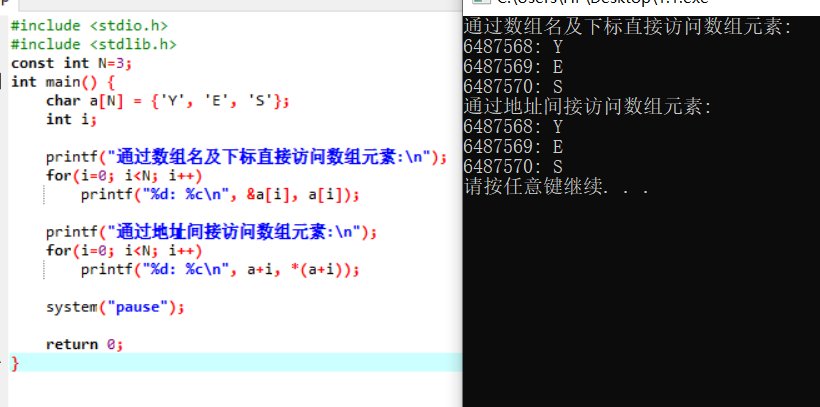
#include <stdio.h>
#include <stdlib.h>
const int LINE=2;
const int COL=3;
int main() {
int a[LINE][COL] = {1,2,3,4,5,6};
int i,j;
printf("通过数组名及下标直接访问数组元素:\n");
for(i=0; i<LINE; i++)
for(j=0; j<COL; j++)
printf("%d: %d\n", &a[i][j], a[i][j]);
printf("通过地址间接访问数组元素:\n");
for(i=0; i<LINE; i++)
for(j=0; j<COL; j++)
printf("%d: %d\n", a[i]+j, *(a[i]+j));
printf("二维地址中a+i表示的地址:\n");
for(i=0; i<LINE; i++)
printf("%d\n", a+i);
system("pause");
return 0;
}
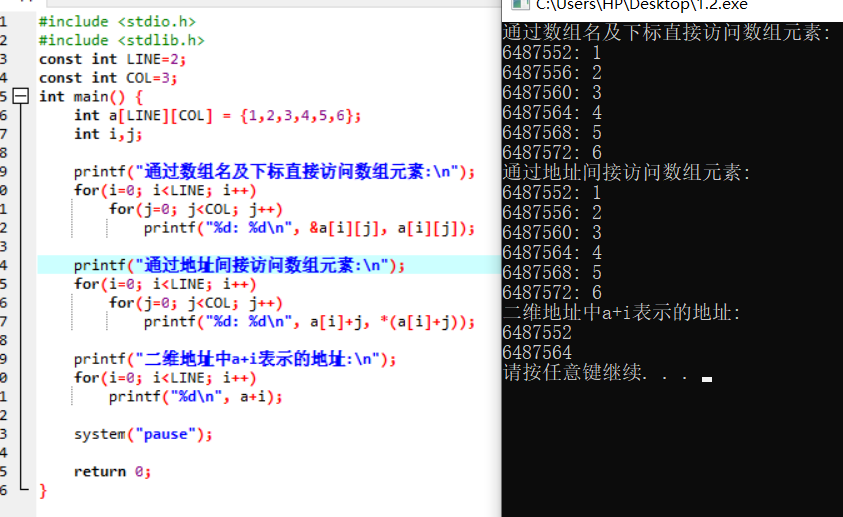
#include <stdio.h>
#include <stdlib.h>
const int N=3;
int main() {
int a[N];
int *p,i;
for(p=a; p<a+N; p++)
scanf("%d", p);
for(p=a; p<a+N; p++)
printf("%d ", *p);
printf("\n");
p = a;
for(i=0; i<N; i++)
scanf("%d", p+i);
for(i=0; i<N; i++)
printf("%d ", *(p+i));
printf("\n");
system("pause");
return 0;
}
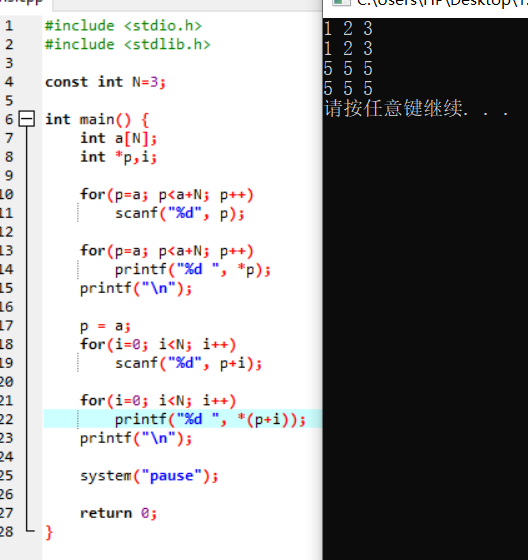
#include <stdio.h>
#include <stdlib.h>
int main() {
int a[2][3] = {1,2,3,4,5,6};
int i,j;
int *p;
int (*q)[3];
for(p=&a[0][0]; p<&a[0][0] + 6; p++)
printf("%d ", *p);
printf("\n");
for(q=a; q<a+2; q++)
for(j=0; j<3; j++)
printf("%d ", *(*q+j));
printf("\n");
system("pause");
return 0;
}
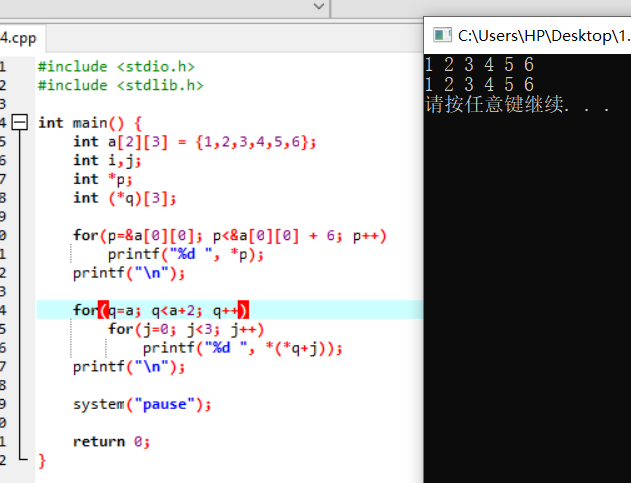
#include <stdio.h>
#include <stdlib.h>
const int N=5;
int binarySearch(int x[], int n, int item);
int main() {
int a[N]={2,7,19,45,66};
int i,index, key;
printf("数组a中的数据:\n");
for(i=0;i<N;i++)
printf("%d ",a[i]);
printf("\n");
printf("输入待查找的数据项: ");
scanf("%d", &key);
index=binarySearch(a,5,key);
if(index>=0)
printf("%d在数组中,下标为%d\n", key, index);
else
printf("%d不在数组中\n", key);
system("pause");
return 0;
}
int binarySearch(int x[], int n, int item) {
int low, high, mid;
low = 0;
high = n-1;
while(low <= high) {
mid = (low+high)/2;
if (item == x[mid])
return mid;
else if(item<x[mid])
high = mid - 1;
else
low = mid + 1;
}
return -1;
}
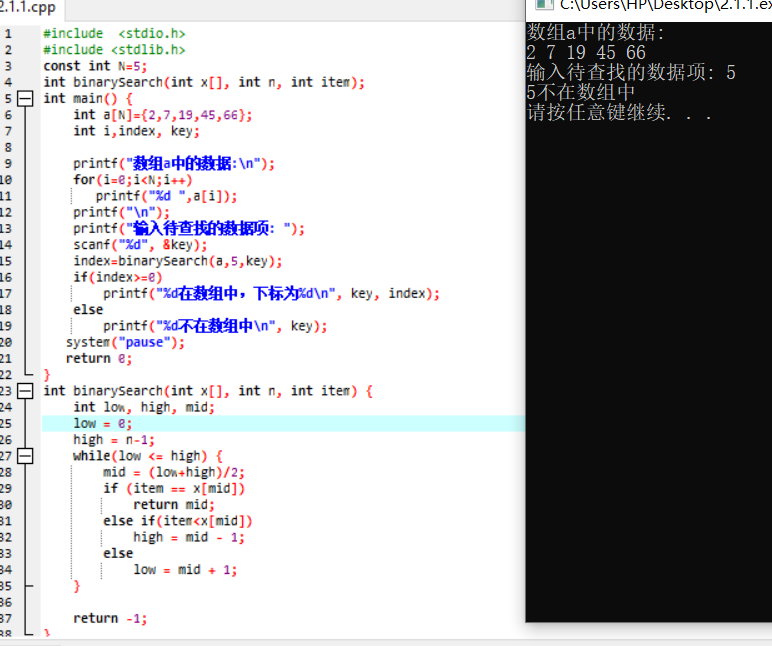
#include <stdio.h>
#include <stdlib.h>
#define N 10
int fun(int *a,int m)
{
int low = 0, high = N-1, mid;
while(low<high)
{
mid = (low+high)/2;
if(m < *(a+mid))
high = mid-1;
else if(m > *(a+mid))
low = mid+1;
else
return(mid);
}
return(-1);
}
int main()
{
int i,a[N]={-3,4,7,9,13,24,67,89,100,180},k,m;
printf("a数组中的数据如下:\n");
for(i=0;i<N;i++)
printf("%d ",a[i]);
printf("\nEnter m: \n");
scanf("%d",&m);
k = fun(a,m);
if (k>=0)
printf("m=%d,index=%d\n",m,k);
else
printf("Not be found!\n");
system("pause");
return 0;
}
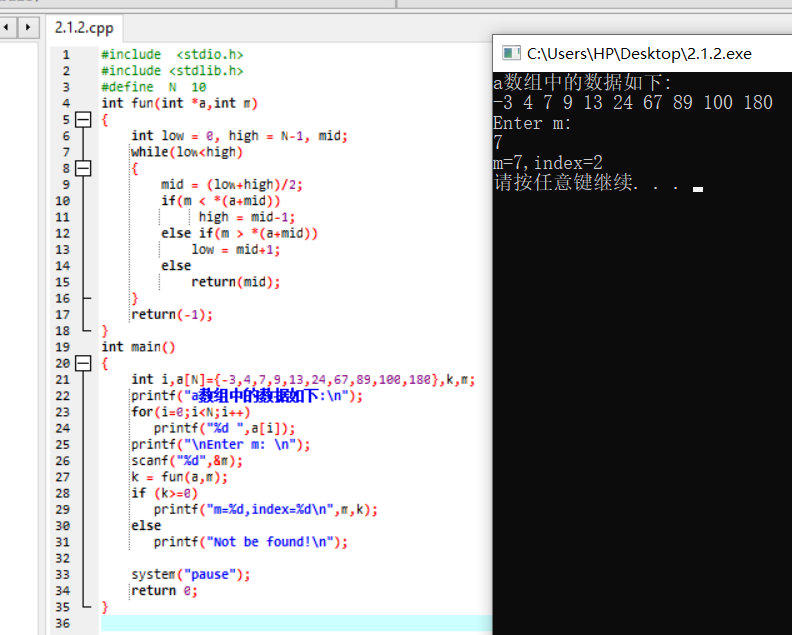
#include <stdio.h>
#include <stdlib.h>
const int N=5;
void selectSort(int [], int);
void input(int [], int);
void output(int [], int);
int main() {
int a[N];
printf("输入%d个整数\n", N);
input(a, N);
printf("排序前的数据:\n");
output(a,N);
selectSort(a,N);
printf("排序后的数据:\n");
output(a, N);
system("pause");
return 0;
}
void input(int a[], int n) {
int i;
for(i=0; i<n; i++)
scanf("%d", &a[i]);
}
void output(int a[], int n) {
int i;
for(i=0; i<n; i++)
printf("%d ", a[i]);
printf("\n");
}
void selectSort(int a[], int n) {
int i, j, k, temp;
for(i=0; i<n-1; i++) {
k = i;
for(j=i+1; j<n; j++)
if (a[j] < a[k])
k = j;
if(k != i) {
temp = a[i];
a[i] = a[k];
a[k] = temp;
}
}
}
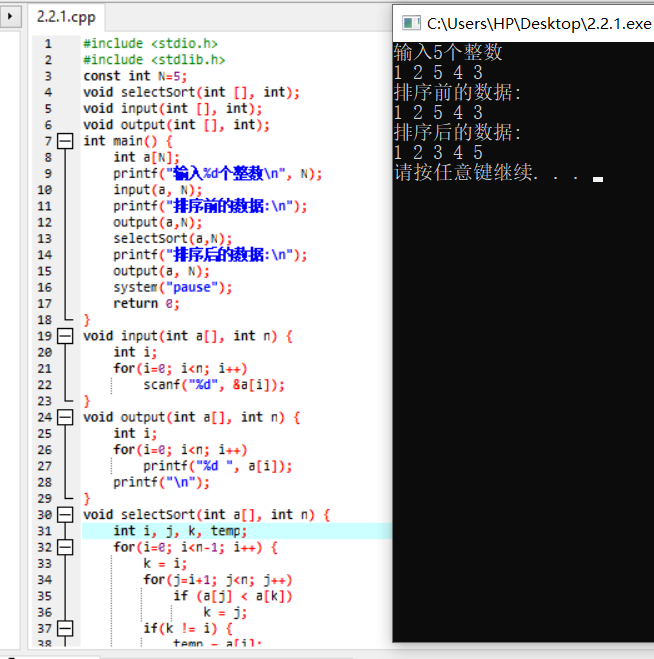
#include <stdio.h>
#include <string.h>
#include <stdlib.h>
void selectSort(char str[][20], int n );
int main() {
char name[][20] = {"John", "Alex", "Joseph", "Taylor", "George"};
int i;
printf("输出初始名单:\n");
for(i=0; i<5; i++)
printf("%s\n", name[i]);
selectSort(name, 5);
printf("按字典序输出名单:\n");
for(i=0; i<5; i++)
printf("%s\n", name[i]);
system("pause");
return 0;
}
void selectSort(char str[][20], int n) {
int i,j,k;
char temp[20];
for(i=0;i<n;i++)
{
for(k=i,j=i+1;j<n;j++)
if(strcmp(str[k],str[j])>0)
k=j;
if(k!=i)
{
strcpy(temp,str[i]);
strcpy(str[i],str[k]);
strcpy(str[k],temp);
}
}
return;
}
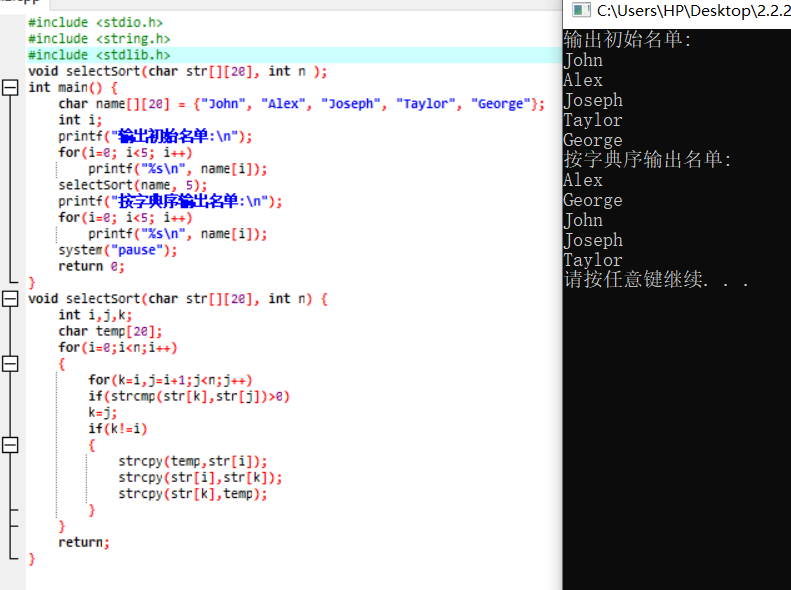
/*
假定输入的字符串中只包含字母和*号。
编写函数,实现:
除了字符串前导的*号之外,将串中其他*号全部删除。
在编写函数时,不得使用C语言提供的字符串函数。
例如,若字符串中的内容为****A*BC*DEF*G*******
删除后,字符串中的内容则应当是****ABCDEFG
*/
#include <string.h>
#include <stdio.h>
#include <stdlib.h>
void fun(char *a) {
/*****ERROR********/
int i=0;
char *p = a;
/****ERROR***/
while(*p && *p == '*') {
a[i] = *p;
i++;
p++;
}
while(*p) {
/******ERROR*******/
if(*p != '*') {
a[i] = *p;
i++;
}
p++;
}
/******ERROR*******/
a[i] = *p;
}
int main() {
char s[81];
printf("Enter a string :\n");
gets(s);
/***ERROR******/
fun(s);
printf("The string after deleted:\n");
puts(s);
system("pause");
return 0;
}
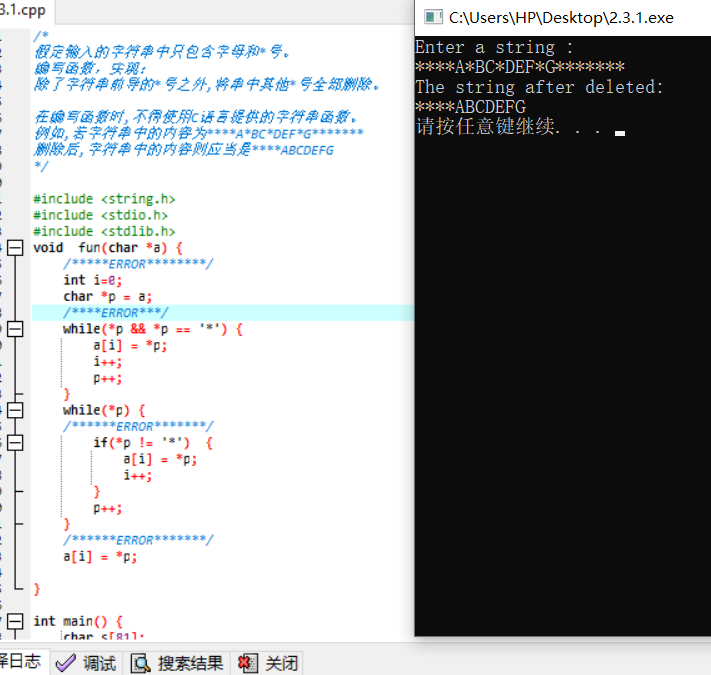
/*
假定输入的字符串中只包含字母和*号。
编写函数,实现:
除了字符串前导和尾部的*号之外,将串中其他*号全部删除。
在编写函数时,不得使用C语言提供的字符串函数。
例如,若字符串中的内容为****A*BC*DEF*G*******
删除后,字符串中的内容则应当是****ABCDEFG******
*/
#include <stdio.h>
#include <stdlib.h>
#include <string.h>
void fun(char *a) {
/**ERROR******/
int i;
char *t = a, *f = a;
char *q = a;
while(*t)
t++;
t--;
while(*t == '*')
t--;
while(*f == '*')
f++;
/***ERROR***/
while (q>f) {
a[i] = *q;
q++;
i++;
}
while (q<t) {
/***ERROR**/
if(*q == '*') {
a[i] = *q;
i++;
}
q++;
}
while (*q) {
a[i] = *q;
i++;
q++;
}
/**ERROR**/
a[i]='0';
}
int main () {
char s[81];
printf("Entre a string:\n");
gets(s);
/**ERROR**/
fun(char s[81]);
printf("The sting after deleted:\n");
puts(s);
system("pause");
return 0;
}
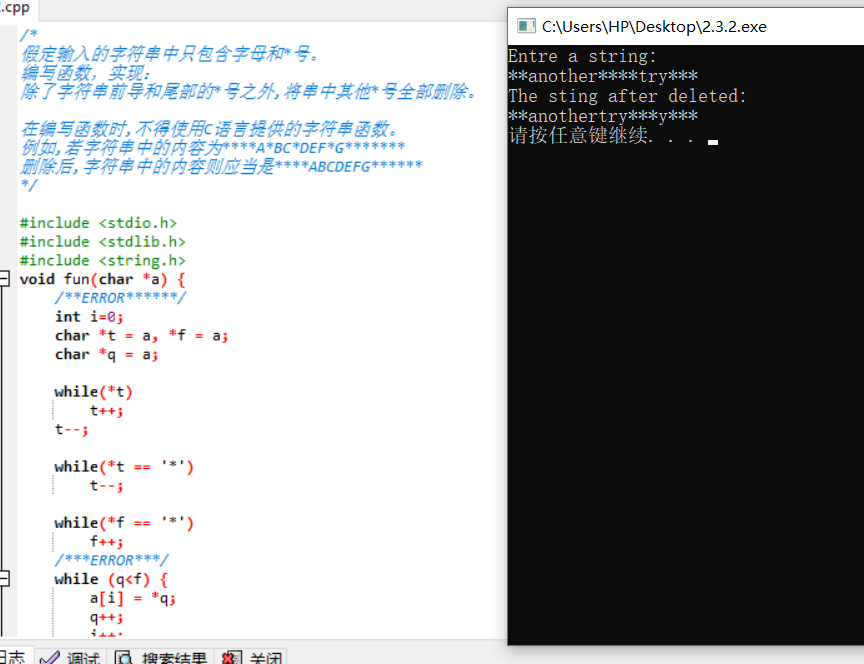


 浙公网安备 33010602011771号
浙公网安备 33010602011771号